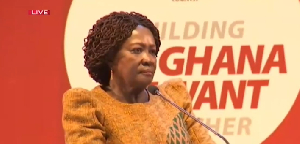Opinions of Thursday, 1 November 2012
Columnist: Darko, Otchere
Developing An Efficient Human Resource In Ghana
I have followed the “free education” debate that has been going on in the country with keen interest, because I believe that human resource, and for that matter education, forms the bedrock of the development and progress of every modern nation.
The on-going debate, therefore, except for its partisan direction and tone, is a good national exercise. Sadly, though, the importance of the exercise has been slightly downgraded, because it has become an NPP/NDC debate, rather than a national one. What surprises me most is the tendency to give the NPP and its leader (Nana Akufo-Addo) the seeming credit of being the sole advocate of the free education idea that includes, to my knowledge, four other parties; namely the CPP, the PPP, the NDP, and finally Maame Akua Donkor’s GFP; all on record to be proposing the same free education.
In my view, free education from Primary School up to Senior High School is not only necessary; it is also, and more importantly, a must if we want to create an employable population base in a modern nation such as Ghana. Why should education in Ghana be free up to Senior High School? One may ask.
I like to use a practical example to answer this hypothetical question, which is that, I have a personal knowledge of a classmate from Primary [School] Class One to Middle [School] Form Four who was a very intelligent boy and who nearly always came first in all our terminal examinations from Primary Class One to Middle Form Four, which today’s is the equivalent of the last year of Junior High School. This boy did not write the then Common Entrance Examination that enabled intelligent pupils to be identified and selected for admission to Secondary Schools in those days. This exceptionally intelligent classmate of mine did not write the Common Entrance Examination because he knew in advance that his parents could not afford to pay his Secondary School fees, if he were to sit and pass the examination. If Secondary Schools were free, he would in fact have sat and passed the Common Entrance Examination. Despite his intelligence, however, this boy never had the chance to go to Secondary School, let alone go to University. Thus, he ended up becoming one of the “wasted talents” in my town.
Free education, per se, does not automatically lead to individual and national development and progress. I do, in fact, accept this small ‘hitch’. To confront this hitch, however, there is need for free education to be ‘on target’. This means that it should lead to a specific end. And for it to lead to a specific end, free education should be qualitative enough for its end to be beneficial to both the individual recipient and the nation at large. Also, it should be well-resourced, in terms of closeness of location and quality and quantity of classrooms, teachers, teaching materials, etc. In other words, for free education to be end-related, leavers from the various stages of education should not find themselves becoming “drop-outs”, “failures”, “unemployable” or “unemployed”. This means that when educational policy is set, it must provide a system within which a Ghanaian child can easily progress from one level of education to another level within the community in which he or she lives, without having to go through avoidable stress, such as unnecessary walking for miles to access the various levels of pre-University education. Apart from equal access to classrooms, human resources, and teaching materials; and, also, irrespective of where he or she lives, or whether his or her parents have enough financial resources or not, every Ghanaian child must benefit from equal delivery of non-tutorial, outside-class activities, such as games, sports and athletics. The distribution of other educational logistics, such as vehicles or houses to teachers and heads of schools in different parts of the country, must also be equitable, rather than partial, if free education is to fully benefit both individual recipients and the nation at large. Finally, at the end of the various pre-University levels of education, school leavers who do not want to go, or cannot continue to University and other Tertiary Educational Institutions should be able to get low-level employment within the private or public sectors of the economy. On the other hand, those who want to go, or can proceed to University and other Tertiary forms of Educational Institutions must be able to do so with the help of “student-loan schemes” that should form a vital part of the financing of all Tertiary Institutions, in order to give equal financial leverage to all prospective applicants to, and users of the final stage in modern education.
Is free education in Ghana that economically leads to availability of the right human resource-base needed to speed up the development and progress of the nation possible?
Yes, it is very possible for any party led by visionary and incorruptible leaders to make education up to Senior High School free and qualitative through proper and rational management of the nation’s economy. As one example, among many, if the government makes it EXTREMELY UNREWARDING for politicians and other top public officials in Ghana to be corrupt, the nation can save and channel into education, the vast financial resources that get siphoned away from government coffers every year into individual pockets through corruption and mismanagement. Those who argue that free education is not feasible are either not taking into consideration the huge state resources that every year get siphoned away through corruption and mismanagement, or they do but fail to factor them into their thinking to believe that there is need to end corruption, so as to divert into general public use all the financial resources that otherwise end up going into the pockets of corrupt politicians and other public officials in Ghana. Furthermore, if we could set our national priorities in the right perspective, as we should, we would come to the realisation that.......
IT IS BETTER TO USE GHANA’S LIMITED RESOURCES TO OFFER FREE EDUCATION FOR THE BENEFIT OF SENIOR HIGH SCHOOL PUPILS THAN WASTE THEM ON THE CREATION OF ADDITIONAL MEMBERS OF PARLIAMENT WHO GO TO THE AUGUST HOUSE TO MERELY DOUBLE THEIR SALARIES, IN ADDITION TO “LOOTING” STATE ASSETS THROUGH VARIOUS CORRUPT AND ADMINISTRATIVE PRACTICES AND CONVENTIONS ESTABLISHED BY THEMSELVES FOR THEIR PRIVILEGED POLITICAL CLASS, AT A TIME WHEN CHILDREN IN MANY RURAL COMMUNITIES IN GHANA ATTEND CLASSES UNDER TREES.
*The saddest realisation of all is that, among those who oppose free education, there is a sizeable proportion of Ghanaians who FULLY benefitted from Dr Kwame Nkrumah’s free education for Northerners.... a scheme that helped more than 90% of school-going children from our three northern regions to access the education that our many poor parents there could not afford to give to their children, had it not been Dr Kwame Nkrumah’s free education for Northerners borne out of his exemplary leadership and vision.
Source: Otchere Darko












